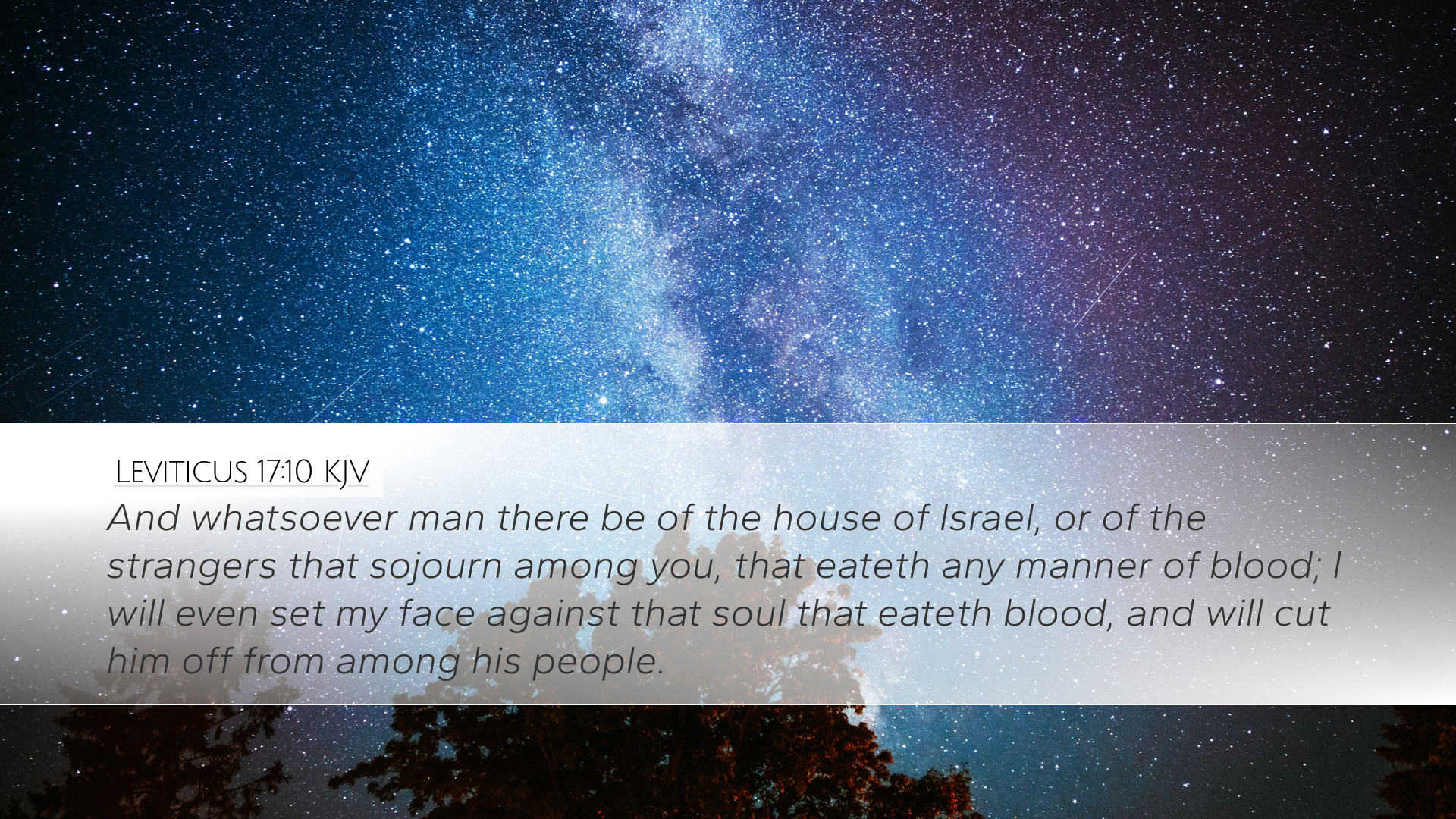Commentary on Leviticus 17:10
Leviticus 17:10 states: "And any man of the house of Israel, or of the strangers that sojourn among them, that eateth any manner of blood; I will even set my face against that soul that eateth blood, and will cut him off from among his people."
Overview
This verse forms part of the Holiness Code that instructs the Israelites on the regulations concerning their dietary practices, particularly regarding the consumption of blood. Blood, in the biblical context, is of great significance as it represents life and is associated with covenant and atonement.
Significance of Blood
In the ancient Israelite culture, blood was seen as sacred. It was often used in sacrificial rites and symbolized the life of the creature being sacrificed:
- Matthew Henry highlights that blood represents life; thus, its proper handling was crucial in maintaining holiness.
- Albert Barnes notes that the prohibition against consuming blood was rooted in the understanding that blood belonged to God and was meant for atonement, connecting it to the sacrificial system.
- Adam Clarke explains that the life principle depicted in blood underscores its significance and underscores a deeper spiritual reality about the sanctity of life itself.
Who is Addressed?
The command addresses both the Israelites and the strangers (foreigners) residing among them:
- This indicates the inclusive nature of God's laws, as they applied not just to the covenant community but also to those living within its borders.
- Henry emphasizes the universal call to holiness that extends beyond ethnicity, welcoming all in the community to adhere to God's statutes.
- Barnes points out that this reflects the importance of maintaining purity and obedience in worship practices for all who are part of God's people, regardless of their origins.
The Judgment Against Consumption of Blood
The verse also warns against consuming blood, stating that God will set His face against the person who does so:
- Matthew Henry interprets this as an indication of divine displeasure, emphasizing the serious consequences of disobedience.
- Barnes elaborates that "cutting off" refers to being excluded from the community, which serves as both a punishment and a means to uphold communal holiness.
- Clarke underlines the gravity of this warning, indicating that such actions could lead to spiritual and physical ramifications, including being cut off from the life of the nation.
Theological Implications
This command is laden with theological significance:
- It shapes the understanding of atonement, pointing to Jesus Christ as the ultimate sacrifice whose blood brings redemption.
- It reflects God’s desire for His people to live in a way that honors Him, which includes understanding the sacredness of life.
- Henry reflects on this as a foreshadowing of the New Covenant, where the blood of Christ would fulfill the requirements of the Law and establish a deeper sense of community among believers.
Application for Today
For modern believers, Leviticus 17:10 reminds us of the importance of holiness:
- It calls attention to how Christians today must regard their spiritual lives with utmost seriousness, avoiding any practices that would lead to spiritual death or separation from God.
- In a wider context, this verse encourages respect for life and acknowledges God’s sovereignty over all creation.
- The warning against the consumption of blood can be seen as a metaphor for engaging in actions that go against God’s design, asking us to evaluate the ways we engage with the world around us.
Conclusion
Leviticus 17:10 serves as a crucial text for understanding the overarching principle of holiness in the life of God’s people. As reiterated by our commentators, the dietary laws serve not merely as arbitrary rules but as divine instructions aimed at preserving the sanctity of life, establishing a communal identity, and foreshadowing the greater redemptive work of Christ.


